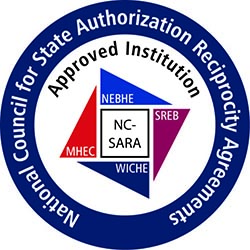Consumer Information
The Higher Education Act of 1965, as amended by the Higher Education Opportunity Act of 2008 (HEOA), requires institutions of higher education that participate in federal financial aid programs (e.g., federal loan programs, Pell grants, Federal Work-Study) to make available to students, parents, and others, specific information about their colleges and universities. This reporting ranges from general information about an institution, to its educational programs and services, to its policies, and to its student outcomes.
Distance Education, State Authorization and Reciprocity Agreement (SARA)
The State Authorization Reciprocity Agreement (SARA) is an agreement among member states, districts, and territories in the United States, which establishes national standards for interstate offering of postsecondary distance education courses and programs. It is intended to standardize the process of offering online courses and programs by postsecondary institutions located in states other than the state in which the enrolled student(s) are residing. SARA is overseen by a national council (NC-SARA) and administered by four regional education compacts.
Carnegie Mellon University has been approved by the Commonwealth of Pennsylvania to participate in NC-SARA and was accepted as a SARA institution on May 2, 2017; additionally, Carnegie Mellon secured approval through NC-SARA on May 18, 2017. Carnegie Mellon University is listed as an approved, participating institution on the NC-SARA website (http://www.nc-sara.org/). At this time, 49 of the 50 United States are SARA members. California is not a member of SARA; however, Carnegie Mellon is able to offer online education to California residents.
Except where prohibited by applicable law, students who reside outside of the United States generally are not restricted from enrolling in our online programs. Some online programs do require in-person attendance at one of Carnegie Mellon’s teaching locations (e.g., Carnegie Mellon’s Pittsburgh, Pennsylvania campus) for short portions of the program. Students interested in enrolling in a specific online program are encouraged to contact the person designated by the online program for questions about the program's requirements or enrollment.
Additional Information
Student Complaints & Consumer Information by State
Students should follow the complaint and grievance processes specified in the Student Handbook, the Discriminatory and Sexual Misconduct Policy (Interim) and/or other applicable CMU policies. If a student believes a complaint or grievance was not resolved satisfactorily after following these processes, unresolved complaints and grievances may be directed, dependent upon the student’s location or mode of enrollment, as follows:
MSCHE Accreditation
CMU is accredited by the Middle States Commission on Higher Education (MSCHE). MSCHE provides opportunities for students, faculty, staff, and members of the public to submit a number of different types of complaints related to an applicant or member institution’s compliance with the Commission’s Standards for Accreditation, Requirements of Affiliation, Commission policies and procedures, or the institution’s own policies and procedures: https://www.msche.org/complaints/
Distance Education students – NCSARA
The student should begin the complaint process with the institution and if a resolution is not found, the student may file a complaint with the NCSARA Pennsylvania State Portal Entity contact: https://nc-sara.org/state-portal-entity-contacts
California
Complaints may be filed with the California Bureau for Private Postsecondary Education (BPPE): https://www.bppe.ca.gov/enforcement/complaint.shtml
New York
Complaints may be filed with the New York State Education Department: https://www.nysed.gov/college-university-evaluation/complaints
Pennsylvania
Complaints may be filed with The Pennsylvania Department of Education (PDE): https://www.pa.gov/agencies/education/programs-and-services/instruction/postsecondary-and-adult-education/students-complaints.html
Washington DC
Complaints may be filed with The Higher Education Licensure Commission:
https://helc.osse.dc.gov/topic/helcadmin/community-stakeholders/public-complaints
HEOA Disclosures (Financial Aid)
The Higher Education Opportunity Act of 2008 (H.R. 4137) (HEOA) was signed into law on August 14, 2008. This law mandates that we provide you with additional information in a variety of formats.
We have posted information relevant to financial aid on this page so that it is easily accessible to students, parents and the general public. View the HEOA disclosures.
Professional Licensure Disclosures at the State Level
In accordance with Title 34 Code of Federal Regulations Part 668.43(a)(5)(v) regarding information educational institutions must make readily available to enrolled and prospective students, Carnegie Mellon is providing the following professional licensure/certification disclosures:
School of Architecture
The Bachelor of Architecture (B.Arch) and the Master of Architecture (M.Arch) degree programs are National Architecture Accrediting Board (NAAB)-accredited degree programs and meet the educational requirements for architectural licensure in all US States and the District of Columbia. Since each state has additional requirements for architectural licensure and those requirements vary among the states, students are advised to review the requirements for architectural licensure of the state in which they intend to obtain their license. The National Council of Architectural Registration Boards (NCARB) website and individual state architectural licensing board websites are good resources for researching additional architectural licensure requirements by state.
School of Music, Teacher Education Certification
Carnegie Mellon has determined that the Carnegie Mellon K-12 Music Education Certification program meets the educational requirements for educator licensure for instrumental, vocal, and general music (K-12) in the public schools of Pennsylvania, but has not determined whether it meets the educational requirements for educator licensure in other states or the District of Columbia. Students should also be aware that each state also has additional educator licensure requirements and those requirements vary among the states. Students are advised to review the requirements for educator licensure of the state in which they intend to obtain their license prior to starting the academic program. Individual state educator licensing board websites are good resources for researching additional educator licensure requirements by state.
Pennsylvania also participates as a reciprocating state, which allows for educators holding an educator’s license in one state to earn a license in another state, subject to meeting specific state specific requirements of the other state. Information about educator licensure in Pennsylvania may be found on the PA Department of Education Website.
CIT/School of Engineering, Undergraduate Degree Programs
Carnegie Mellon’s engineering programs (Mechanical Engineering, Civil and Environmental Engineering, Chemical Engineering, Materials Science and Engineering, and Electrical and Computer Engineering) are accredited by the Engineering Accreditation Commission of ABET. In order to obtain professional engineer licensure in any state, students must graduate from an ABET-accredited program and meet testing and/or work experience requirements of the state in which they intend to obtain their license. Students are advised to review the requirements for professional engineer licensure of the state in which they intend to obtain their license. Information about professional engineer licensure in Pennsylvania may be found on the PA Department of State website. The National Society of Professional Engineers website and individual state professional engineer licensing board websites are good resources for researching additional professional engineer licensure requirements by state.
Graduation & Retention Rates
Written Arrangements
Student Location Determination
Under the code of federal regulations (CFR) 600.9(c)(2)(iii) regarding state authorization requirements, an educational institution must make a determination regarding the state in which a student is located at the time of the student's initial enrollment in an educational program and, if applicable, upon formal receipt of information from the student, in accordance with the institution's procedures, that the student's location has changed to another state. Students are expected to review and update their off-campus residence and their permanent address in Student Information Online (SIO) at the beginning of each academic year and when they change their local and/or permanent addresses. For purposes of state authorization requirements, student location will be determined based on information in the Carnegie Mellon Student Information System (S3) in the following order:
- Student’s academic program code and;
- Student’s campus address, or;
- Student’s off-campus residence (if #1 and #2 cannot ascertain location) or;
- Student’s permanent address (if #1, #2, and #3 cannot ascertain location).
Gainful Employment Disclosures
Effective July 1, 2019, Carnegie Mellon University decided to execute the U.S. Department of Education's Early Implementation of the Rescission of the Gainful Employment Rule. Institutions that implement early are no longer required to post the Gainful Employment disclosure template and may remove the template and any other Gainful Employment disclosures that were previously required from their webpages. For more information, please contact the Student Financial Aid Office at 412-268-1353.
Criminal Justice Information
Carnegie Mellon University selects its first-year students from a large group of very qualified candidates. Carnegie Mellon does not collect or review criminal history information as part of the undergraduate admission process. However, individuals who are admitted to Carnegie Mellon will be required to disclose any past criminal conviction as a part of the enrollment process.
During the enrollment process, if a student discloses a criminal conviction, the information will provided to the Associate Vice President for Community Standards and Diversity Initiatives in Student Affairs. Per the policy for Review After a Charge or Conviction of a Crime, the Office of Community Standards and Integrity will review any applicable matters in accordance with the university community standards process outlined in The Student Handbook, The Word. Students are not required to disclose arrests and/or charges that did not result in a conviction or any matter that was adjudicated as a juvenile delinquent or with youthful offender status. Additionally, students are not required to disclose any criminal conviction that has been expunged, sealed, overturned, annulled, pardoned, destroyed, erased, impounded or otherwise required by law or ordered by a court to be kept confidential.

